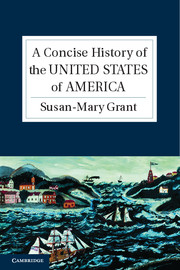Book contents
- Frontmatter
- Contents
- Figures
- Tables
- Acknowledgments
- Introduction
- 1 New Found Land
- 2 A City on a Hill
- 3 The Cause of All Mankind
- 4 Self-Evident Truths
- 5 The Last, Best Hope of Earth
- 6 Westward the Course of Empire
- 7 A Promised Land
- 8 The Soldier's Faith
- 9 Beyond the Last Frontier
- 10 A Land in Transition
- 11 Armies of the Night
- Notes
- Guide to Further Reading
- Biographies
- Index
Biographies
Published online by Cambridge University Press: 05 June 2012
- Frontmatter
- Contents
- Figures
- Tables
- Acknowledgments
- Introduction
- 1 New Found Land
- 2 A City on a Hill
- 3 The Cause of All Mankind
- 4 Self-Evident Truths
- 5 The Last, Best Hope of Earth
- 6 Westward the Course of Empire
- 7 A Promised Land
- 8 The Soldier's Faith
- 9 Beyond the Last Frontier
- 10 A Land in Transition
- 11 Armies of the Night
- Notes
- Guide to Further Reading
- Biographies
- Index
Summary
Samuel Adams (1722–1803)
One of the Founding Fathers of the American nation, Samuel Adams was born in Quincsy, Massachusetts, and graduated from Harvard College in 1743. He briefly considered a career in the law, and even more briefly, and unsuccessfully, shifted to business, before taking up what would become his permanent career in politics, serving in the Massachusetts House of Representatives and as a member of the Boston Town Meeting in the 1760s. When, in 1763, the British Parliament mooted taxing the colonies to raise revenue to cover the cost of the Seven Years War (or French and Indian War), Adams was instrumental in composing a considered colonial response to this unwelcome suggestion. He argued that
[if] our trade may be taxed, why not our lands? Why not the produce of our lands, and every thing we possess, or use? This we conceive annihilates our charter rights to govern and tax ourselves. It strikes at our British privileges, which, as we have never forfeited, we hold in common with our fellow subjects, who are natives of Britain. If tastes are laid upon us in any shape, without our having a legal representation, where they are laid, we are reduced from the character of free subjects, to the state of tributary slaves. We, therefore, earnestly recommend it to you, to use your utmost endeavours to obtain from the general court, all necessary advice and instruction to our agent, at this most critical Juncture.
- Type
- Chapter
- Information
- A Concise History of the United States of America , pp. 409 - 432Publisher: Cambridge University PressPrint publication year: 2012

